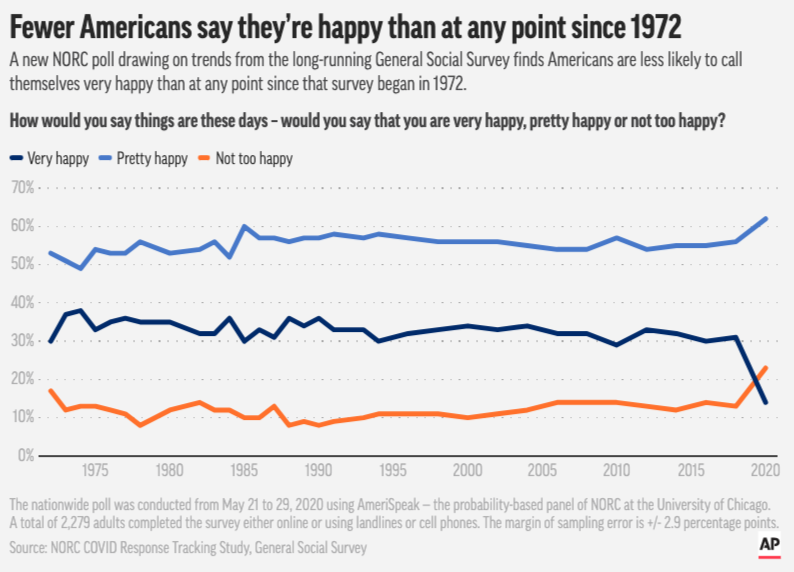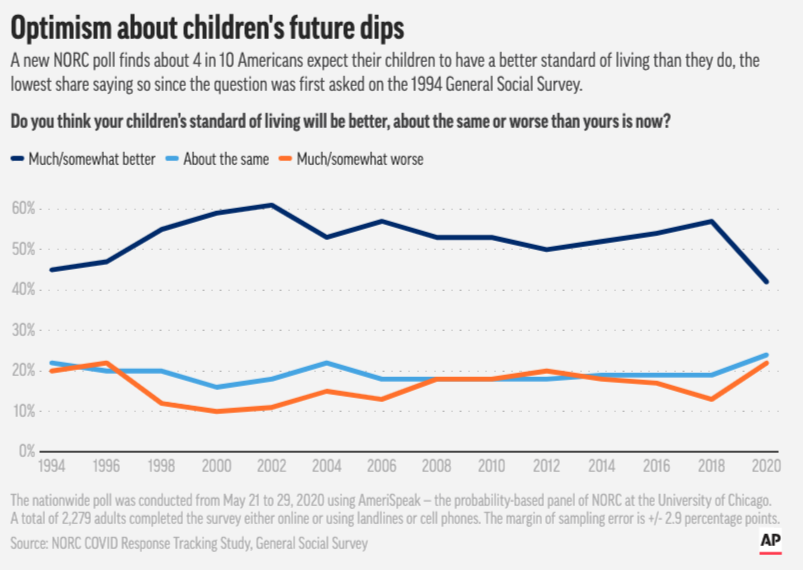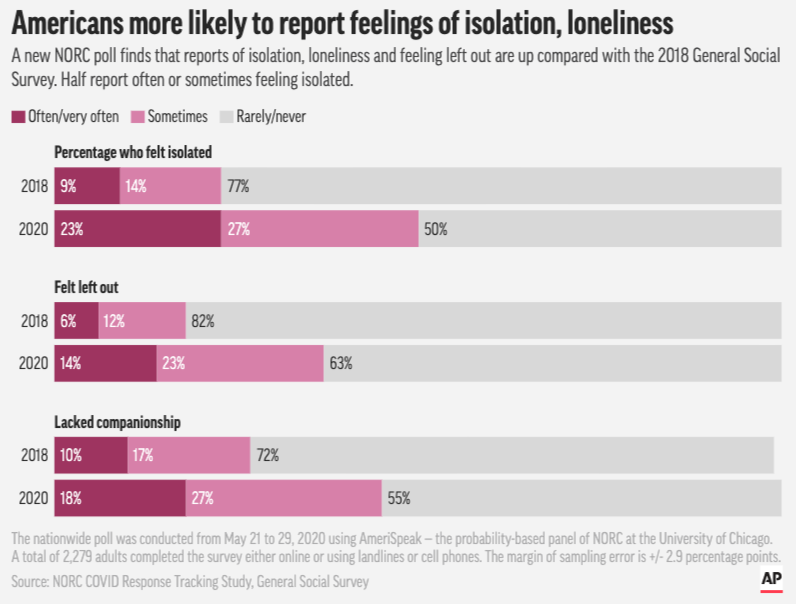Americans are more miserable in 2020 than they've been in nearly five decades, according to the COVID Response Tracking Study, conducted by the National Science Foundation (NORC) at the University of Chicago, reported AP News.
The survey of 2,000 Americans reveals that just 14% of adults say they're very happy, down from 31% in 2018. That year, 23% said they felt isolated, it has since doubled, now 50%.
Conducted in May, the survey captures Americans' beliefs, mental health, and outlook before, and during the COVID-19 outbreak.
However, most responded before the death of George Floyd, which triggered nationwide social unrest and widespread destruction of many downturn districts in the country. Americans were already facing hardships because of virus-related issues if that was a job loss, insurmountable debts, isolationism, and mental health problems.
With nearly a half-century of survey data -- this was the first time the survey dipped below 29% of Americans have called themselves very happy, which has now crashed to 14%. If social unrest was reflected in the polling data, the level is likely much lower as the country has descended into socio-economic chaos.
Another finding is the rapid deterioration in the standard of living. Only 42% of Americans believe their children will have a better life than they did -- opposed to 57% answering the same question in 2018.
The amount of Americans reporting that they're lonely has doubled since 2018, which is not surprising given several months of lockdowns to mitigate the spread of the virus.
Louise Hawkley, a senior researcher with NORC, was surprised that more respondents weren't lonelier -- noting that social media and video conferencing has enabled people to connect digitally.
"It isn't as high as it could be," she said. "People have figured out a way to connect with others. It's not satisfactory, but people are managing to some extent."
AP spoke with several Americans, who detailed their sad stories as hope for a better life has collapsed:
Lexi Walker, a 47-year-old professional fiduciary who lives near Greenville, South Carolina, has felt anxious and depressed for long stretches of this year. She moved back to South Carolina late in 2019, then her cat died. Her father passed away in February. Just when she thought she'd get out and socialize in an attempt to heal from her grief, the pandemic hit.
"It's been one thing after another," Walker said. "This is very hard. The worst thing about this for me, after so much, I don't know what's going to happen."
Jonathan Berney, of Austin, Texas, said that the pandemic — and his resulting layoff as a digital marketing manager for a law firm — caused him to reevaluate everything in his life. While he admits that he's not exactly happy now, that's led to another uncomfortable question: Was he truly happy before the pandemic?
"2020 just fast-forwarded a spiritual decay. When things are good, you don't tend to look inwards," he said, adding that he was living and working in the Miami area before the pandemic hit. As Florida dealt with the virus, his girlfriend left him, and he decided to leave for Austin. "I probably just wasn't a nice guy to be around from all the stress and anxiety. But this forced an existential crisis."
Berney, who is looking for work, said things have improved from those early, dark days of the pandemic. He's still job hunting but has little savings to live on. He said he's trying to kayak more and center himself so he's better prepared to deal with any future downturn in events.
Melinda Hartline, of Tampa, who was laid off from her job in public relations in March, said she was in a depressed daze those first few weeks of unemployment. Then she started to bike and play tennis and enrolled in a college course on post-crisis leadership.
Today, she's worried about the state of the world and the economy, and she wonders when she can see her kids and grandkids who live on the West Coast — but she also realizes that things could be a lot worse.
"Anything can happen. And you have to be prepared," she said. "Whether it's your health, your finances, whether it's the world. You have to be prepared. And always maintain that positive mental attitude. It's going to get you through it."
The smoke and mirrors of "the greatest economy ever" has come crashing down with tens of millions unemployed and an economic crash that could take several years to recover. Nevertheless, a virus pandemic and social unrest continue to rage across the country as the Trump administration and Federal Reserve bailout corporate America/Wall Street elites at the expense of the real economy -- no wonder the average American's psyche has collapsed to five-decade lows -- it is because the country is imploding as wealth inequality is soaring.
https://www.zerohedge.com/mark...es-hope-kids-futures



